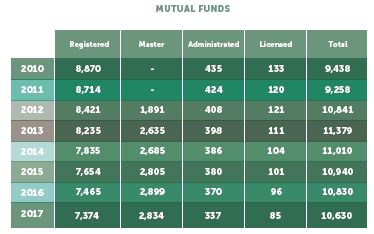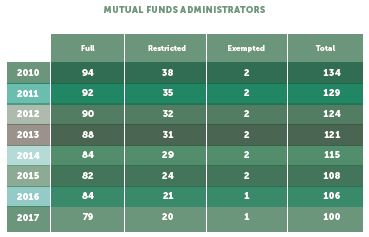When the board of the International Organisation of Securities Commissions (IOSCO) published its Report on the Fourth IOSCO Hedge Fund Survey in November 2017, the findings confirmed the continuing strength and widespread appeal of the alternative investment industry to investors. It also confirmed that the Cayman Islands remains the pre-eminent jurisdiction for domiciling of alternative investment structures.
The biannual report, which is based on data as of September 30, 2016, highlights that assets under management of the survey participants grew in the preceding 24 months by 24% to $3.2 trillion and that Cayman domiciled structures accounted for 53% of those assets, a percentage which is largely unchanged over that 2 year period. The sample size reflected in the survey is sufficiently material for the growth rates and domicile concentrations to serve as reliable proxies for the industry as a whole, reflecting the capital aggregation and performance returns which continue to attract a diverse range of investors to alternative funds. The survey also highlights the dominance of US based investment managers in net asset value terms with over 76% of assets managed by them, as compared to relatively limited capital aggregation by European and Asian based asset managers.
The popularity of hedge funds can also be seen in the statistics published by the Cayman Islands Monetary Authority which continue to show the number of hedge funds registered in the Cayman Islands above the 10,000 mark, with overall growth in the first three quarters of 2017. The consistency of registrations over recent years is all the more significant given the maturing of the industry and the year on year replacement of older structures with more traditionally focused investment strategies with more progressive strategies seeking investment returns in more imaginative investment styles and combinations.
The economic influences driving capital deployment into funds and the performance returns on invested assets include the anticipated tax reforms in the US leading to lower corporate tax rates and increased corporate value for investors, continued progress in key developing markets, asset class expansion, the emergence of digital currencies for mainstream investing and other such matters. As the options expand, the industry continues to face challenges in terms of ever increasing demands for greater transparency, international cooperation and regulation.
Cayman has been and remains at the vanguard of international initiatives to increase government to government and regulator to regulator cooperation and transparency. A leader in this area since 1990 when it entered into its first information exchange treaty with the US, Cayman continues to engage constructively and cooperatively with governments around the world to support global initiatives on the exchange of tax information, beneficial ownership and anti-money laundering. By doing so, Cayman continues to receive favourable assessments from globally respected organisations such as the OECD, FATF and IMF who recognise that the drivers for domiciling in Cayman lie in expertise, familiarity and tax neutrality.

While these may not play to the populist mythology, numerous respected economic studies continue to show that capital aggregation in the neutral setting provided by Cayman structures increases deployed capital in underlying investments and therefore increases gross returns to investors with the higher resultant tax yields in their home jurisdictions than would otherwise be the case. Over the course of 2017, local initiatives have sought to improve the robustness of our anti-money laundering legislation and associated guidance notes, introduced new structuring concepts in LLCs and foundations, created a legal framework for the reporting to government of the beneficial ownership of companies and upgraded the Cayman Islands Monetary Authority's interface with the industry to an enhanced electronic reporting platform.
Each of these initiatives has been preceded by the public/private consultation partnership which has been a hallmark of the development of Cayman over the last 40 years. Cooperation between industry, the government and the regulator to introduce new, or improve existing, statutory or regulatory regimes is carried out collaboratively to ensure that the legislation or regulation once in effect is both operable and effective.

The cooperation will continue in 2018 as international demand for additional measures appears unlikely to reduce. With Britain's exit from the EU still to take shape and the future of EU based banking and finance yet to be resolved, it is reasonable to expect that additional regulation and requirements for trading in or aggregating capital from the EU will increase.
While the EU influence on alternatives is, according to the IOSCO survey, relatively limited, it is reasonable to assume that the next evolutionary phase for the industry will take those considerations into account and adapt as it has done in the past.
No jurisdiction acquires 53% market share of any global industry and maintains that proportion year on year without adapting and evolving to meet current and future needs.
The content of this article is intended to provide a general guide to the subject matter. Specialist advice should be sought about your specific circumstances.

